May 22nd, 2013 by JJW
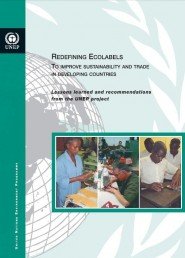
In 2012, at the invitation of the United Nations Development Programme (UNEP) Sustainable Consumption and Production branch, I had the pleasure of interviewing and working with dozens of stakeholders from over a dozen countries to explore how ecolabels are encouraging sustainable development and improving international trade opportunities. The report “Redefining ecolabels to improve sustainability and trade in developing countries: Lessons learned and recommendations from a UNEP project” explores both the history and background of ecolabelling as a tool to promote sustainable production and consumption and to evaluate a specific five-year UNEP project.
You can download the report here on the new (and very informative) Sustainable Production and Consumption Clearinghouse.
More about this report from the introduction:
This report aims to evaluate to what extent the project succeeded in reaching its intended goals, to draw lessons learned, and present recommendations for future actions. The report contains four major sections. Section I introduces readers to ecolabels and the differences between different information systems, provides an overview of how these systems are used in developed and developing countries as well as introduces the major challenges, opportunities, and debates around voluntary labelling and standards globally.
Section I also traces the debates about ecolabels as possible barriers to trade. This includes possible implications of recent World Trade Organization cases and other issues affecting the discussions on Technical Barriers to Trade, and the relevance of this UNEP project to the debates, including the importance of working with established rules, practices, and disciplines that avoid unnecessary barriers in developing and using internationally-accepted ecolabels.
Section II introduces the UNEP ‘Enabling developing countries to seize ecolabelling opportunities’ project and partners, and the assessment methodology.
Section III of this report focuses on the assessment of the project results in relation to its goals. This section is based on interviews with key stakeholders in the project, as well as background research. It reviews the project as a whole, including a sector and country analysis. It describes the baseline situations and major developments that happened during the five years of the project.
Section IV provides lessons learned and recommendations to project partners and other stakeholders on further improvement and future projects. Suggestions are targeted toward all stakeholders involved in the ecolabelling field.
The report’s methodology is based on the compilation and review of all project documents and relevant literature on trade and ecolabels. It also involved interviews with participants from the project, including funders, implementing bodies, country partners, and some target enterprises when available.
August 4th, 2010 by JJW
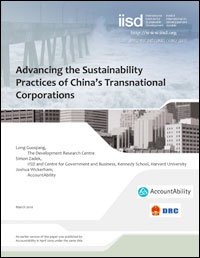 The International Institute for Sustainable Development (IISD) has published the final version of a paper I co-wrote with Simon Zadek and Long Guoqiang as part of a multi-year “sustainable trade strategy for China” with multiple stakeholders from China and abroad, supported by the Swiss SECO.
The International Institute for Sustainable Development (IISD) has published the final version of a paper I co-wrote with Simon Zadek and Long Guoqiang as part of a multi-year “sustainable trade strategy for China” with multiple stakeholders from China and abroad, supported by the Swiss SECO.
As IISD writes on its website,
“This paper examines how the Chinese business community can best use international sustainability standards to enhance its competitiveness in global markets, in so doing more effectively placing themselves on a sustainable economic path. We highlight the opportunity for Chinese businesses, supported by enabling public policies, to become a force in shaping the next generation of sustainability standards in global markets as a competitive strategy consistent with China’s broader interests. Doing this requires Chinese actors to engage more deeply in existing standards initiatives and take a more explicit role among the communities that have developed and now govern these standards. Effective engagement in such standards is a means of offsetting competitive disadvantages or creating competitive advantages when businesses and nations choose a more sustainable development path. This paper sets out both strategic options for businesses and policy options for the Chinese government to realize sustainable development and competitiveness goals.” —IISD Publications Centre
This is the final version of a paper launched a year earlier by AccountAbility, which I posted about here.
Download the final paper here.
July 6th, 2010 by JJW
 I co-wrote the China chapter of this new compendium of corporate social responsibility.
I co-wrote the China chapter of this new compendium of corporate social responsibility.
The World Guide to CSR:
A Country-by-Country Analysis of Corporate Sustainability and Responsibility
Edited by Wayne Visser and Nick Tolhurst
December 25th, 2009 by JJW
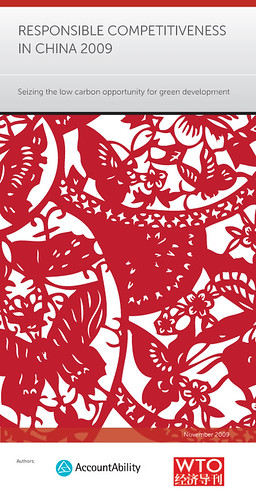
On November 30, I joined colleagues at the EU China Business Summit in Nanjing, Jiangsu, which dovetailed with the EU-China political meeting.
That day in Nanjing, under support from the Sino-Swedish Corporate Social Responsibility cooperation, AccountAbility launched the report Responsible Competitiveness in China 2009: Seizing the low carbon opportunity for green development.
This from AccountAbility:
Businesses in China are increasingly working with government and civil society to shift markets to reward sustainable development. These responsible business practices are becoming more and more embedded in the country’s emerging green industrial policy and low carbon development pathways. In some areas, China is set to leapfrog into the elite group of global green innovators.
These are some of the highlights from the report ‘Responsible Competitiveness in China 2009: Seizing the low carbon opportunity for green development’, launched at the 5th annual EU-China Business Summit as part of the Swedish EU presidency on 30 November in Nanjing, China.
The analysis presented in this report shows that China is developing a distinctive low carbon, responsible pathway, namely that:
- Low carbon industrial policies offer Chinese businesses and consumers huge opportunities
- Responsible business ventures in China are now impacting global markets relaunching China’s brand
- Strong government leadership, incentives and supportive policies are playing key roles
The report was independently researched and written in a unique collaboration between AccountAbility and the China WTO Tribune, with support from the Sino-Swedish CSR Cooperation Project. Learn more about the report’s key findings.
The Joint Statement of the 12th EU-China Summit specifically “decided to strengthen high-level dialogue and exchanges between think-tanks from both sides, and to promote and support regular exchanges.” Read the Joint Statement in full. AccountAbility’s partnership with the China WTO Tribune is an example of this kind of knowledge and collaboration exchange.
May 5th, 2009 by JJW
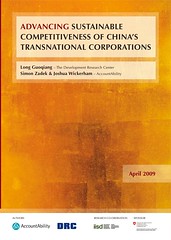 A Paper by Long Guoqiang, Simon Zadek, and Joshua Wickerham
A Paper by Long Guoqiang, Simon Zadek, and Joshua Wickerham
AccountAbility’s Managing Partner, Simon Zadek, launched this report at the Boao Forum this year in Hainan and at the China Entrepreneur Club’s Daonong Green Companies Forum in Beijing. This paper is part of a two-year study with the State Council’s Development Research Center on “China’s sustainable trade strategy” working with several central-level Chinese research organizations and three international think tanks.
This paper examines how the Chinese business community can best use international sustainability standards to enhance their competitiveness in global markets and more effectively place themselves on a sustainable economic pathway.
It highlights the opportunity for Chinese businesses, supported by enabling public policies, to become a force in shaping the next generation of sustainability standards in global markets as a competitive strategy consistent with China’s broader interests. Doing so will require deeper engagement in existing standards initiatives, and a more explicit role amongst the communities that have developed and now govern them. Effective engagement in such standards is a means of off-setting competitive disadvantages, and creating competitive advantages when businesses and nations choose a more sustainable development path.
This paper sets out both strategic options for businesses and policy options for the Chinese government to realise sustainable development and competitiveness goals.
Download the full English version, full Chinese version, or the bilingual executive summary.
AccountAbility DRC _ China Sustainable Trade Strategy_Press Release_Chinese and English the press release.
Mentioned in the Harvard Business Review blog here.
Video interview with me on NetEase discussing link between sustainability and Chinese competitiveness (in Mandarin Chinese).
April 25th, 2009 by JJW
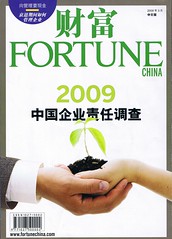 This is Fortune China’s 3rd annual survey of Chinese business leaders. This year Fortune surveyed 20,000 people using a survey designed by AccountAbility. The cover this year is much more uplifting than last year’s.
This is Fortune China’s 3rd annual survey of Chinese business leaders. This year Fortune surveyed 20,000 people using a survey designed by AccountAbility. The cover this year is much more uplifting than last year’s.
Download the full English version here.
The Chinese version is on Fortune China’s website here.
December 9th, 2008 by JJW
It may not be a best seller, but it should be more factual than Joe the Plumber’s upcoming book. Soon to be released, soon to be outdated, my second encyclopedia contributions include biographies on: The Development Research Center’s former director Wang Mengkui, Caijing founder-editor Hu Shuli, Huaneng’s former director Li Xiaopeng, “Iron-Faced” Auditor General Li Jinhua, and Sina.com founder Wang Zhidong. Check out the Biographical Dictionary Of New Chinese Entrepreneurs And Business Leaders on Amazon.


 I co-wrote the China chapter of this new compendium of corporate social responsibility.
I co-wrote the China chapter of this new compendium of corporate social responsibility.


